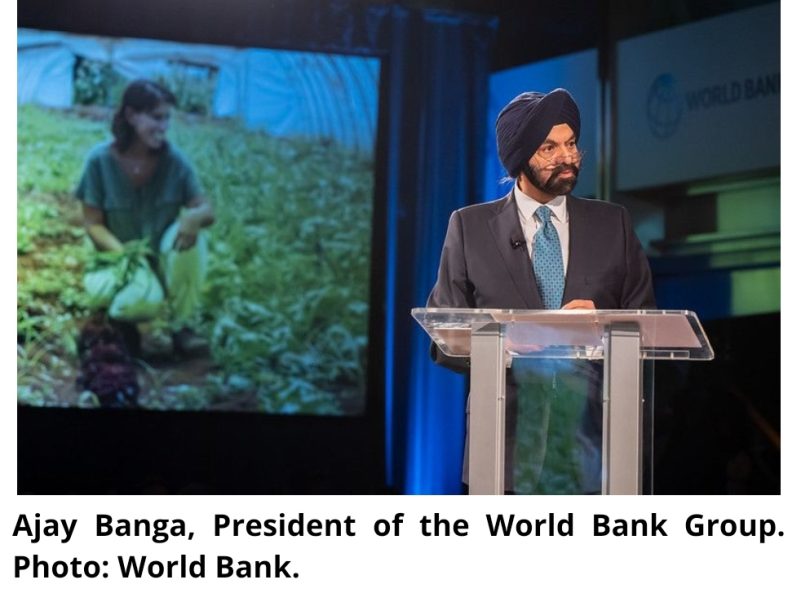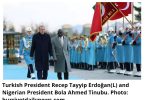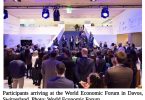The 2025 Annual Meetings of the World Bank Group and the International Monetary Fund concluded the last days of the meetings not with a simple communique, but with a profound and complex mandate.
Gathered under the ambitious theme, “From Sectors to Systems: Building Job-Rich Economies at Scale,” finance ministers, central bank governors, civil society leaders, and private sector executives confronted a dual reality. On one hand, the World Bank Group, under the energetic leadership of Ajay Banga, unfurled a new, holistic playbook for development focused on creating sustainable employment ecosystems. On the other hand, the IMF, led by Kristalina Georgieva, delivered a stark diagnosis of the global economy: a world defined by persistent uncertainty, suffocating debt, and geopolitical fractures that threaten to undermine the very foundations of progress.
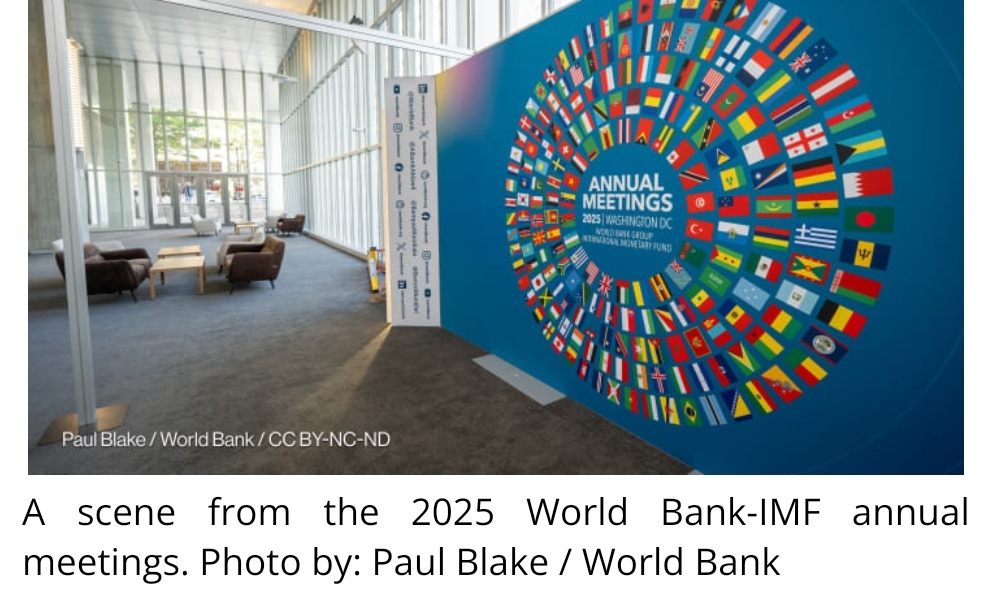
The central challenge was clear. With over a billion young people poised to enter the global workforce in the next decade, the imperative to create millions of quality jobs transcends economics. It is, as the meetings underscored, the most reliable pathway from poverty to dignity, self-sufficiency, and hope.
The Bank’s New Playbook: From Sectors to Systems
The World Bank’s response to this challenge represents a significant strategic pivot. The institution’s message throughout the week was one of intentional transition, moving away from financing isolated, single-point projects toward catalyzing entire economic ecosystems. This “systems” approach dominated the Bank’s agenda, built on three core pillars: investing in foundational infrastructure and human capital; supporting policy and regulatory reforms that foster a business-friendly environment; and, crucially, mobilizing private investment at a scale that public institutions alone cannot muster.
This new vision was most powerfully articulated through the launch of AgriConnect, a flagship campaign aimed at transforming one of the world’s oldest sectors. Mr. Banga laid out a bold vision to reshape agribusiness so it delivers not just food security but also broad-based employment and growth. Today, family farms, including more than 500 million smallholders, produce approximately 80% of the world’s food. Yet, paradoxically, too many remain trapped in subsistence poverty, disconnected from markets, finance, and technology.
AgriConnect: A Test Case for Ecosystem-Level Investment
AgriConnect calls for a coalition of private capital, governments, and donor partners to invest in the infrastructure, finance, and policy frameworks necessary to help these small-scale farmers evolve into sustainable agribusinesses. “We’ve set a target to double our agribusiness commitments to $9 billion annually by 2030—aiming to mobilize an additional $5 billion,” Mr. Banga announced. He encapsulated the Bank’s new collaborative ethos with a memorable mantra: “Steal shamelessly and share seamlessly—that is how we succeed together.”
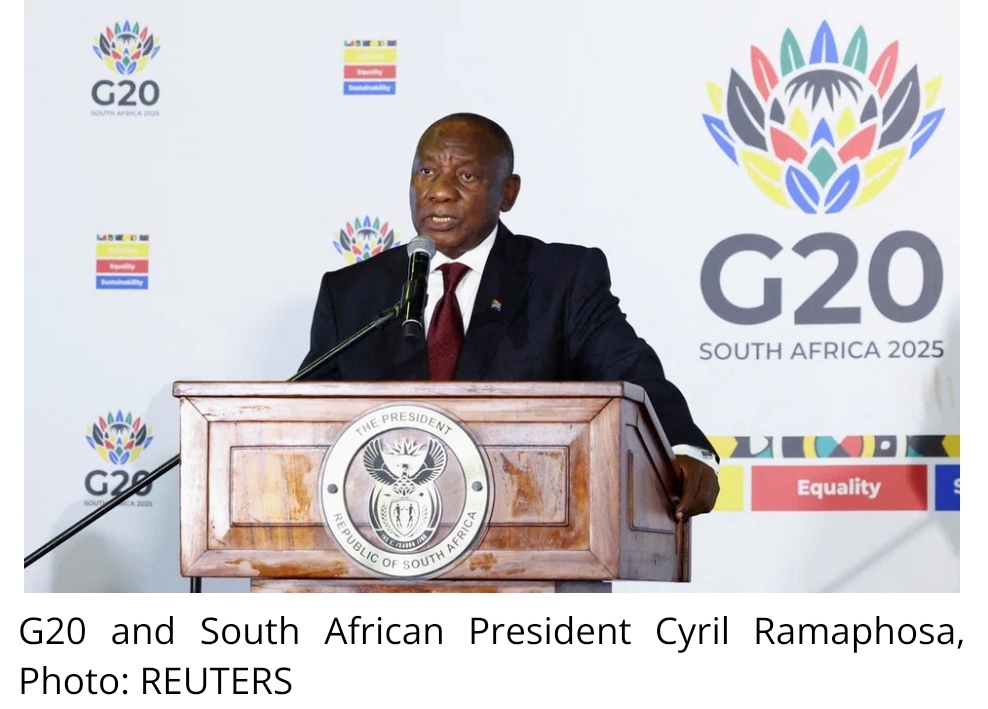
This systems-level thinking was reinforced across numerous events. The inaugural Leaders’ Speaker Series provided a platform for influential voices to connect global policy with local impact. Dr. Mona Mourshed, CEO of the nonprofit Generation, shared practical insights on transforming education-to-employment systems to equip young people with relevant skills. Later in the week, H.E. Dr. Rania Al-Mashat, Egypt’s Minister of Planning, Economic Development, and International Cooperation, spoke to the practicalities of implementing such ambitious reforms on the ground, highlighting the human stories behind the development data.
This focus on data and results was tangible. The popular Data Playground gave attendees a hands-on opportunity to explore how real-time data shapes decisions, while an interactive Jobs board allowed participants to digitally construct their own “jobs ecosystem” using the Bank’s three-pillar framework.
The Bank’s renewed focus on partnership was also a central theme. The annual Townhall with Civil Society Organizations became a forum for open exchange between Mr. Banga, his senior leadership, and global civil society leaders. The dialogue underscored that progress requires not just capital, but trust. This sentiment was formalized at the Development Committee Meeting, where governors from all 189 member countries endorsed the Bank’s vision for a faster, more effective institution. They affirmed the call for governments and the private sector to think differently, viewing investments not as standalone solutions but as interconnected building blocks of a national jobs ecosystem.
The IMF’s Sobering Diagnosis: A World Defined by Debt
Yet, as the World Bank mapped out this ambitious blueprint for prosperity, the International Monetary Fund provided a sobering assessment of the terrain. The IMF’s latest World Economic Outlook and Fiscal Monitor, released during the meetings, painted a picture of a global economy that, while more resilient than feared six months ago, remains fundamentally fragile. Growth is slow, inflation remains stubbornly elevated, and interest rates are high.
IMF Managing Director Kristalina Georgieva drove this point home in her keynote remarks and press briefings. “Uncertainty has become the new normal,” she stated, identifying a “dark cloud” still hanging over the global economy. The primary source of this anxiety is debt. While debt levels in some low-income countries have declined, this is largely because they have been shut out of financial markets. In emerging and industrial economies, debt continues to climb.
Ms. Georgieva was unequivocal: “High levels of debt suffocate economies.” This single issue formed the central tension of the 2025 meetings. The vast fiscal space required to build job ecosystems, invest in human capital, and fund the climate transition that the World Bank advocates simply does not exist in many nations. It is being consumed by crippling debt service payments.
A Widening Gap: The Call for Reform vs. Official Inertia
Throughout the week, the gap between acknowledging this crisis and the political will to enact systemic reform was palpable. The calls for action from outside the official chambers were loud and clear. Ahead of the meetings, a letter from leading economists published in The Guardian urged finance ministers for immediate, meaningful debt relief. In parallel, Reuters reported that 165 civil society organizations had pressed South African President Cyril Ramaphosa to use his G20 presidency to champion ambitious reform. African policymakers, such as Djibouti’s Finance Minister Ilyas Moussa Dawaleh, argued forcefully in publications like The Economist that the continent needs a new debt deal to address its uniquely high borrowing costs.
The Civil Society Policy Forum, running concurrently, became a hub for these critical discussions. Sessions like “A Jubilee 2025 Call for a Fair Debt Architecture” and “Scrutinizing the IMF role on debt issues” sought to bridge the gap between ethical imperatives and policy solutions.
Despite this mounting pressure, the official communiqués offered concern without concrete structural change. The Intergovernmental Group of Twenty-Four (G24) statement reaffirmed support for “improving the implementation of the Common Framework,” but stopped short of demanding new instruments. Similarly, the G20 Finance Ministers and Central Bank Governors communiqué acknowledged that unsustainable debt undermines development but offered no major shifts beyond existing positions. The Global Sovereign Debt Roundtable recognized that rising debt service burdens are crowding out spending on education, health, and infrastructure, but recommended no deep reforms.
In essence, the official consensus reflected a growing anxiety about the consequences of debt, but not yet a shared narrative that this represents a systemic failure requiring a systemic solution. Nonetheless, insiders reported that the private conversations in closed-door meetings were shifting, with a growing admission that countries are now “defaulting on their development,” a recognition that may sow seeds for future policy battles.
Geopolitics, Digitalization, and the New Economic Risks
Side events hosted by institutions such as the Heinrich Böll Foundation and the Atlantic Council offered an alternative vision that official channels lacked. H.E. Hailemariam Desalegn Boshe, former Prime Minister of Ethiopia, stressed that while developing economies must enhance fiscal management and transparency, these domestic actions are insufficient without international support to manage external shocks. A consensus emerged in these roundtables for a two-track approach: comprehensive debt restructuring for distressed nations, combined with expanded concessional lending and new climate-linked instruments, such as green bonds and debt-for-climate swaps, for solvent but liquidity-constrained economies.
As the meetings entered their final 72 hours, these macroeconomic headwinds became entangled with acute geopolitical risk. The “Debate on the Global Economy” on Thursday, featuring Ms. Georgieva, ECB President Christine Lagarde, and Singapore’s President Tharman Shanmugaratnam, set a cautious tone. Ms. Georgieva later expressed specific concern over simmering US-China trade tensions, warning that a cutoff in the flow of rare earths would have a “material impact” on global growth.
The International Monetary and Financial Committee (IMFC) chair’s statement, issued on Friday, reflected this complex web of risks. It flagged concerns about trade tensions, the disruptive potential of artificial intelligence, and excessive global imbalances, while simultaneously calling for central banks to remain committed to price stability.
Even as these existential risks were being debated, other sessions explored the future of the systems themselves. The “New Economy Forum” on Thursday and Friday delved into the digitalization of the economy. Panels on connected digital payments and GovTech showcased how technology can revolutionize public finance and revenue administration, offering pathways to the enhanced domestic resource mobilization that debt-distressed countries desperately need. Workshops on AI and digital platforms examined how these transformative forces are reshaping the very nature of jobs, creating both immense opportunity and significant risk of displacement.
A Dual Imperative: The Synthesis of Jobs and Stability
When the Annual Meetings Plenary Session formally closed the week, it was Ajay Banga who provided the ultimate synthesis, bridging the gap between the IMF’s macroeconomic constraints and the World Bank’s human aspirations. He reinforced that the focus on jobs was not a departure from the Bank’s traditional work, but its ultimate culmination.
“When we focus on jobs, we are not turning away from healthcare, infrastructure, education, or energy—we are doubling down on all of them,” he concluded. “A job is what happens when a school leads to a skill, when a road leads to a market, when a clinic keeps someone healthy enough to work, when energy powers a business. That is how our efforts come together… That is how we deliver what people want most, need most, and deserve most: A job, a chance, a future, and dignity.”
The 2025 meetings, therefore, ended with a powerful new playbook for development but a stark reminder of the global fragility that threatens its execution. The week’s central message was one of profound interdependence. The World Bank’s systems-level ambition for job creation cannot succeed without the macroeconomic stability, fiscal space, and multilateral cooperation that the IMF champions. The delegates departed Washington with the clear understanding that sustainable growth, systemic reform, and human dignity are not separate pursuits, but components of humanity’s most urgent and indivisible shared task.


